|
The documentary production program launched into year four with a diverse group of aspiring doc makers. Students were quickly immersed in video production fundamentals with in-class assignments shooting their first sequences and two-minute profiles of their colleagues. Next on the doc bootcamp itinearary is the annual location shoot in Ottawa's historic Byward Market. Several students have already been thrown into the baptismal fire of documentary, crewing for a doc on the college support workers' strike and shooting the tar sands action on Parliament Hill in September. Over two semesters of intense hands-on production activity students will be developing and producing short form and long form documentaries on wide-ranging topics from vanishing swans on the Rideau Canal to personal journeys of discovery. Under the guidance and tutelage of a seasoned team of doc instructors the crew of 2012 is headed for documentary adventure and discovery.
0 Comments
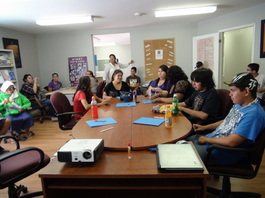 I was hired on as a Teaching Assistant for a documentary production workshop held in Akwesasne's Youth Resource Center, located across Cornwall Island, across the US border into Massenna, New York but “technically” in Quebec, St-Regis Quebec, Mohawk territory. Now, this documentary workshop was 3 days long. The participants were part of a summer co-op program ran by a dedicated and passionate educator named Clarissa Jacobs. The participants ranged in age, from as young as 13 to as “old” as 22. The opportunity was co-ordinated through the Mamidosewin Aboriginal Student Centre at Algonquin College and the School of Media and Design. 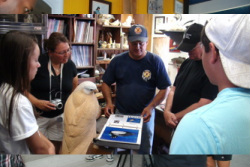 I was there assisting Professor Peter Biesterfeld with this three-day docu workshop. There were a few in class lectures on documentary films, and hand on sessions on operating a camera, using the boom mic, editing and the business of documentary production. Students were obviously eager to get to the filming and they managed to film a variety of sequences and a profile doc on a local carver... and one student even filmed a lacrosse game! Overall, the students had great chemistry and worked really well together, some of them I think had a knack for directing and even operating the camera. 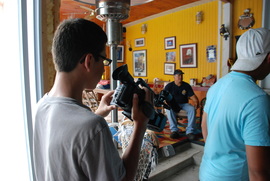 Dalton, one of the youngest participants wrote “I liked operating the camera and directing my own film. I think it gives me a sense of control, what I found difficult was the visuals – it was not my choice but I had to do it”. Some found camera operating to be quite the task. Louie wrote, “I think using the camera was very challenging. Just keeping it real steady”. For Jerome the challenge came from elsewhere, “I liked using the video camera and I thought it was difficult to not laugh and think of something to say in front of the camera”. 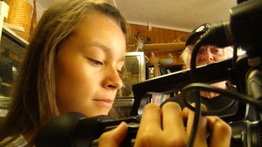 Clearly, it's not all about filming and being in front of the camera, Jaiden wrote “ I think the editing part of the process was the most challenging”. As for Nick, “I liked using the video camera and gaining experience from the workshop, also enjoyed being the sound guy, I thought that was a good experience”. 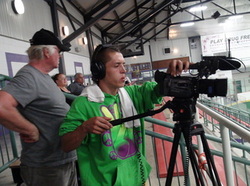 Finally, the last word has to go out to Delray! He had the best metaphors and analogies....and he was also a good camera operator! “To me the camera is like a sandwich. You can always make a sandwich , but what you choose to put on it is up to you”. 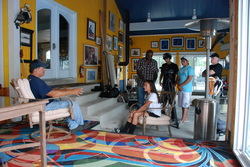 The three-day documentary boot camp was a career sampler for Akwesasne high school students. First they learned visual story telling, how to shoot sequences, a series of connected shots that can be edited into a scene. 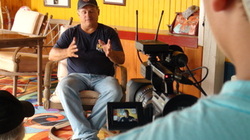 Next they got a crash course in how to plan and shoot a profile of an artist capturing interview, actuality and visuals. They got to apply all of these skills to a five-minute mini documentary about a local carver, Ben Benedict. 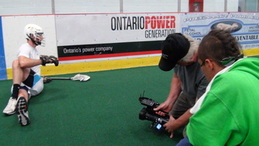 Students received hands-on experience shooting in various locations and came away with a good overview of the various production jobs that need to get done in the making of documentaries. 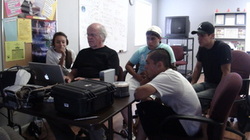 Students screened and discussed their footage then participated in editing decisions during post-production. The video below contains the sequences and mini doc students directed and shot during the three-day workshop. 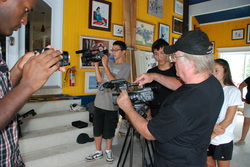 I really enjoyed working with these students. I hope some of them pursue documentary, a few of them had some ideas they wanted to share with the world. I had brought my camera along to see if I could capture something short to share with y’all. - Garmamie Sideau http://www.documocku.blogspot.com/ Thank You's Clarissa Jacobs - Akwesasne Area Management Board’s Youth Resource Center Dwight Powless - First Nation's Liaison Algonquin College Elena Abel - Cultural Activity Coordinator Mamidosewin Center 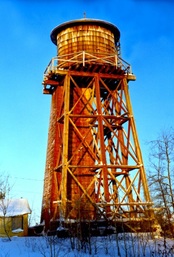 Digital and on line technologies have reshaped the way non-fiction and documentary stories are created and experienced. The documentary production program engaged award-winning interactive documentary producer, Paul Shoebridge of The Goggles to help develop a new Doc Media course. Launching this fall, the course introduces students to interactive storytelling and web documentary creation. Students will be applying the principles and practices of non-linear production that combines photography, text, audio, video, animation and graphics. Using web and digital media creation tools students learn how to import, integrate and design multimedia assets to create their own interactive documentaries. Teaching the course will be Lee Atkinson of KLA Visual Productions. Photo: Water tower in "Welcome To Pine Point" Co-created by National Film Board of Canada and The Goggles media group - 2011 NFB interview with The Goggles We had a fabulous year three in Algonquin's documentary production program. The range of stories was truly diverse profiling activists, artists and lawyers. Fascinating characters peopled
pov docs on quitting smoking to stories of self-discovery in Guatemala to profiles of suburban rappers to Mahatma Gandhi. Poutine anyone? Congratulations to all doc makers in the class of 2011 who discovered the ways of storytelling and who will change the world through their work. Thank you all, it's been a pleasure. PB Hell and Back Again clip from Danfung Dennis on Vimeo. I had a chance to see a couple of films following U.S. troops in Afghanistan while I was at Hot Docs. 'Hell and Back Again' is a new documentary from photographer and director Danfung Dennis, whose work has appeared in the New York Times, Newsweek, and Rolling Stone among many others. Some of his footage from Afghanistan also appears in the outstanding Frontline documentary 'Obama's War'. The film begins almost immediately in combat, following U.S. soldiers as they battle the Taliban before transitioning to follow Sergeant Nathan Harris, who appears in the opening fire fight, as he and his wife attempt to find a parking space outside of a North Carolina Walmart. Harris is now in a wheel chair recovering from being shot in the hip. The film transitions back and forth between Sgt. Harris in Afghanistan and Nathan Harris in North Carolina, linking his wartime experiences to the post-traumatic stress and excruciating recovery he faces at home. After the screening, Danfung Dennis took questions from the crowd and commented that he was motivated to make the film because he felt his photographs were not resonating with the public. With a public that is unwilling to take a closer look at the current U.S.-led military campaigns, I'm not sure many people will see 'Hell and Back Again', but those who do will leave the theatre wide-eyed and speechless. I also attended a fundraising screening of 'Restrepo', which honoured co-director and photojournalist Tim Hetherington, who was recently killed by an RPG while covering the civil war in Libya. 'Restrepo' made the festival circuit last year, and was nominated for the Academy Award for Best Documentary earlier this year. The film follows a U.S. platoon over their 15 month deployment in southern Afghanistan's Korengal Valley, where they spend their time being shot at by unseen enemies and make futile attempts at winning the trust of the local population. Before 'Restrepo' screened, Hetherington's 'Diary' was shown. The experimental documentary of life as a war reporter made the rounds online soon after his passing, and it's definitely worth watching for its powerful imagery and storytelling. Diary (2010) from Tim Hetherington on Vimeo. There's not a whole lot I can say to do justice to these films and directors. They are visceral depictions of modern warfare, but they're also exemplary new documentaries. They deserve every bit of aesthetic appreciation, but 'entertaining' isn't the right word.
C.P. Hot Docs Forum in Hart House's Great Hall, UofT Campus If you thought pitching your film idea to a class of twenty was tough, try this. For two days a parade of documentary filmmakers hawk their wares to a round table of over twenty commissioning editors from all over the world, plus about 300 onlookers. CBC, Channel 4, RAI, and HBO all have a seat at the table, and that's just to name a few.
Graduates of our program don't have much to worry about, though. I had a chance to see about half a dozen presentations and the best ones followed exactly what we were taught in our classroom pitching exercises. Compelling footage, a clear vision, and established access to the subject were the key qualities that got buyers' attention, and each project was able to arrange some one-on-one afternoon meetings with prospective broadcasters and funders. C.P. At Doc U we had workshops on everything from directing to distributing, but the seminar on socially conscious documentary filmmaking stood out. Each of the three panelists had films showing at this year's Hot Docs festival:
Whitney Dow's 'When the Drum is Beating' traces Haiti's political history by following Haitian supergroup Septentrional, a nationally celebrated ensemble that has performed throughout the country for over six decades. 'Hot Coffee' is a documentary by Susan Saladoff, who left her career as a public interest lawyer in the U.S. to make the film. Her film looks at how the McDonald's hot coffee lawsuit in the mid-90s was used to trivialize consumer protection lawsuits. It's scheduled to air on HBO in June. Marshall Curry directed the Academy Award nominated documentary 'Street Fight', covering the 2002 Newark, NJ mayoral campaign, and was at Hot Docs to promote his latest film, 'If A Tree Falls', which tells the story of the Earth Liberation Front. While the topic of the panel was issue-focused documentary, the filmmakers didn't limit themselves. Here's some of what they had to say: "Everyone's going to tell you 'no', so at least be happy with your final film... Funders will always ask 'why this, why now, why not someone else'." - Whitney Dow on the expectations of funders. "Find people that are representative of the issue. You learn your story through them and then you feel something for them." - Susan Saladoff on casting "Go with your gut. Don't listen to what people are telling you that you should do... Get over accuracy, it's about the filmmaker's perception of the experience." - Susan Saladoff on creative control "So I bought a camera and found a story that seemed interesting and read the manual... 'Street Fight' was my first film - I filmed it on my own and edited it in my apartment." - Marshall Curry on becoming a documentary filmmaker C.P. Watch the full episode. See more POV. by Chris Plecash
From the conversational buzz up and down the Hot Docs lineups and panels, Better This World is one of the most popular films at this year's festival. David McKay and Bradley Crowder grew up in Midland, Texas and share their hometown with George W. Bush. At the 2008 RNC convention in St. Paul, Minnesota, the young activists were charged with domestic terrorism over possession of Molotov Cocktails. Better This World tells the story of McKay, Crowder, and their downfall at the hands of a manipulating FBI informant. It's the first film by Katie Galloway and Kelly Duane de la Varga, and it's been gaining accolades at every festival it screens at. The film shows just how good modern documentary can be. It's a thriller that develops with the pacing of a fiction feature, but it builds its suspense through pure non-fiction visual storytelling. Even the on screen text of courtroom transcripts is delivered with a punch. Galloway and de la Varga found a great story and deliver it damn near flawlessly. Look for Better This World on PBS's POV strand later this year, but if it's at a theatre near you in the meantime, go. Immediately. by Chris Plecash
In 1967 a team of Swedish journalists traveled to the U.S. to document African American life. Over the 9 years that followed the filmmakers captured thousands of hours of footage, documenting the Black experience and interviewing leading figures of empowerment such as Stokely Carmichael, Angela Davis, and Black Panther founder Huey Newton. More than 30 years later, the discarded news footage has been woven into a nine-chapter narrative on the emergence and struggles of African American empowerment. Director Göran Hugo Olsson recently brought the film to Hot Docs, where it received critical acclaim. The film is an outstanding historical record. I especially liked the fact that the footage was filmed by outsiders to America. There is a sympathetic fascination that shows through the footage and editing. The cultural significance of the archival footage is punctuated by the narrating voiceover of contemporary artists such as Erykah Badu, Talib Kweli, and ?uestlove. Olsson wisely relies only on the voiceover of the artists, never breaking away from the rich footage from decades past. by Chris Plecash
The first workshop on my Doc U itinerary was 'Directing and the Creative Process'. Directors Dan Sturman (Nanking) and Patrick Reed (Triage) discussed topics ranging from the ethics of access to defining documentary. Both have films in this year's Hot Docs film festival. Sturman's Hollywood Complex follows aspiring child actors and their families as they move to Hollywood in search of fame, and Reed's The Team looks at the role of soccer and the media in post-conflict Kenya. Here are some noteworthy quotes for new filmmakers to chew on: Dan Sturman "Directing documentary is creative decision making in the field and the edit room." "Documentaries have respect for the audience and reality T.V. doesn't." Patrick Reed "You're there for the long haul. You're not a news crew, you're a documentarian." "I don't do pre-interviews, I just hang out. It's better to get stories on film the first time they're told." "Good crew depends on how well camera and sound work together. They should always be fighting." "Menial work on a really good film is better than experience on episodic T.V." |
About Us A collection of field notes, interviews, and reviews from Algonquin's Documentary Production Class of 2012
|
Algonquin College Documentary Production
- Home
- Blogs & News
- Current Students
- Faculty
- Student Docs
- Alumni
- Media
- New Documentary
- Storytellers - Instructional Documentary
- Doc School - Shooting Actuality 1
- Doc School - Shooting Actuality 2
- Doc School - Shooting Actuality 3
- Doc School - Shooting Interviews
- What You Need To Start a Videography Business
- Doc History
- Doc Legends
- NFB Docs On Line
- HotDocs Doc Library
- NFB Capturing Reality
- Top Documentary Films
- Festivals & Organizations
- Class of 2011
- Class of 2010 Album
- NFB Interactive
- WIFF 2012 Wakefield International Film Festival
- Documentary Organization of Canada
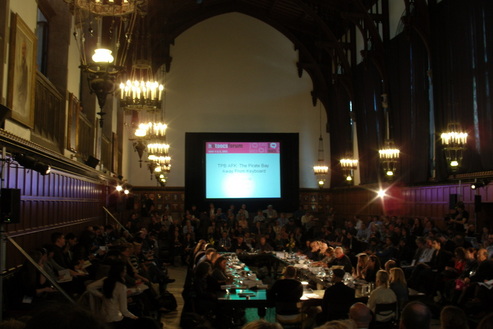
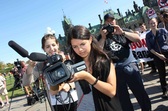

 RSS Feed
RSS Feed
